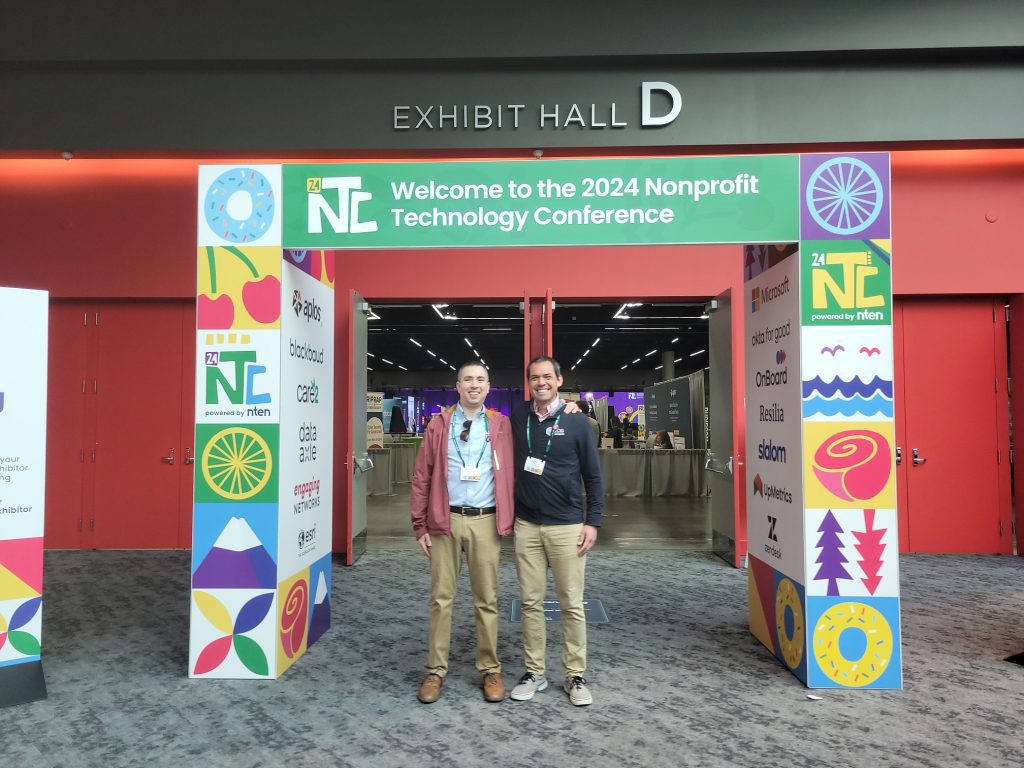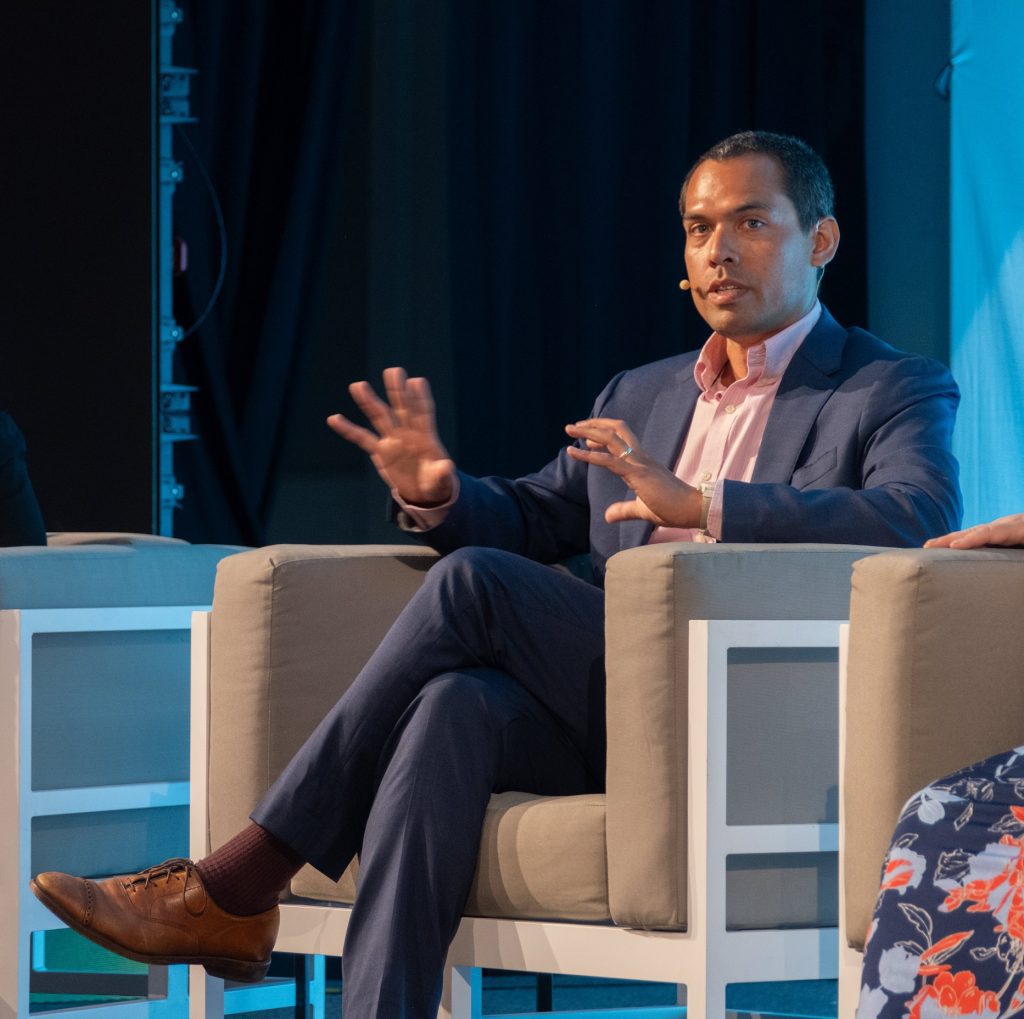
Summary: Founder, Alex Tuck, and Strategy & Partnerships Manager, Andrew Guidarelli, attended the 2024 Nonprofit Technology Conference (24NTC) in Portland, Oregon a few weeks ago. One of the keynotes was by Anasuya Sengupta, co-director and co-founder of Whose Knowledge?, a global multilingual campaign to center the knowledges of marginalized communities (the minoritized majority of the world) online. This article attempts to highlight some of Anasuya’s most impactful messages, using them as a lens through which we can look at 24NTC as a whole.
Conference Overview
This was our first Nonprofit Technology Conference, and it did not disappoint. For 3.5 days, 2K+ nonprofit professionals and consultants descended on East Portland for days packed with learning, networking, and enjoying the rare Spring sunshine. Portland served as a fascinating backdrop for 24NTC for many reasons, the most notable being the relatively quiet downtown area (something that has still not recovered post-COVID) and the prevalence of unhoused community members. Intentional or not, hosting 24NTC in a city where there are clear challenges that nonprofits and governments are compelled to address helped each of us realize the importance of the work we need to do.
As a project management consulting firm focused on helping companies that are having a net positive impact, we have focused on helping companies in four verticals: nonprofit, healthcare, IT professional services, and digital products. At the beginning of the year, we looked hard at the types of clients we were attracting and serving, and we asked ourselves a simple question: are they having a net positive impact? Through 2023, about 25% of our clients have been in the nonprofit space. The most obvious way we could increase the number of clients that are having a net positive impact is by taking on more nonprofits. So, we made a strategic decision to move towards serving more nonprofits (Goal: 75% of our portfolio by 2028).
As a nonprofit founder and Board President, I spend a lot of time educating myself, doing, and improving nonprofit practices. The NTC has been on my radar for over a decade, but I’ve never made the trip to an in-person event. Now that Tuck is focusing more on nonprofit excellence, attending 24NTC, the largest nonprofit technology conference in the country, was an obvious choice.
Decolonizing the Internet
We had the honor of hearing Anasuya Sengupta speak at the first keynote of the event. Anasuya runs an organization, called Whose Knowledge?, which is a global campaign to increase the amount of information on the internet that is produced by marginalized communities. Check out some of these astounding numbers that she shared in her talk:
- 68% of the world is estimated to be online.
- Of that population, 75% is from the global South (southern Asia, Africa, and Latin America).
- There are 7,000+ spoken and signed languages in the world.
- 59.3% of online content is in English; 8.3% (2nd) is Russian.
- 80% of scientific journals & 90% of social science journals are in English!
To grossly oversimplify Anasuya’s points, our economy, which is largely dependent on knowledge, is being dominated by Euro-lingual global citizens. And the internet, which has been one of the greatest tools in history for creating upward mobility, is not representative of the majority of people actually using it. To create an environment that is actually going to be able to create that uplift, the knowledge of the internet must be better representative of the people that are using it.
How Does 24NTC and Decolonizing the Internet Fit Together?
I can say confidently that 24NTC was the most inclusive conference I’ve ever attended (by a long shot). There were captions on all of the screens for those with hearing challenges. There were tables held for folks who were observing Ramadan and abstaining from food and water during lunch. Child care was arranged for attendees who couldn’t leave their children at home. Every event had accessibility instructions and opportunities to request accommodations. There was a lounge for people of color. Wow, the work that had to go into making all of this happen must have been incredible. But it was the right thing to do. It was never a question for this group.
At the end of Anasuya’s talk, she was asked what can you do to start tackling the extreme challenge of decolonizing the internet. She said some obvious by impactful words that stuck with me. (In fact, as she was saying them, I frantically typed them into a text to myself to remember later.)
Look at who’s in the room with you. Not just the physical room, but in the virtual room. Look at who you listen to, who you speak of. Who do you cite? Who’s on your Twitter feed? Who’s on your Instagram reels? Who are you not seeing? What would it look like to learn from someone who does not look like you, who may not speak like you, who may actually speak another language?
NTEN created an environment for three and a half days where people from all over North America of different races, ages, economic backgrounds, physical abilities, languages, gender identities, and skills were able to come together as they are and share their own voices and experiences with others without judgement. While nothing can be perfect, 24NTC felt like a really great depiction of what Anasuya was encouraging us to do — break down barriers, create opportunities for untold stories to be told, and foster environments where all of our wonderful differences can be celebrated and shared.
Bonus Content: Andrew wrote a recap of another 24NTC keynote by Amber Case about picking the right technologies that will improve your organization or lifestyle. Check it out here.
If you attended 24NTC or want to chat more about our experience at the conference, I’d love to compare notes, answer any questions, or share more information. You can book a call with me here.

Alex Tuck
Founder & Managing Principal
Alex Tuck is the founder and managing principal of Tuck Consulting Group, a firm that specializes in project management consulting for small businesses. After several tenures at large and regional management consulting firms, Alex set out to create a firm that was focused on better client outcomes through diverse teams with less focus on profit realization rates. Through the pandemic, the firm has experienced 15x two-year growth, landing it on several lists (#356 Inc. 5000, #12 Inc. NE Regionals, Forbes Next 1000, SBA Emerging Leaders).
In addition to Tuck, Alex has served as a nonprofit board member for several organizations, including a microlending nonprofit he co-founded that operates in Central America. Alex runs his remote-first firm from a farm in Vermont where he lives with his wife and four children. Feel free to reach out to book some time with him.


